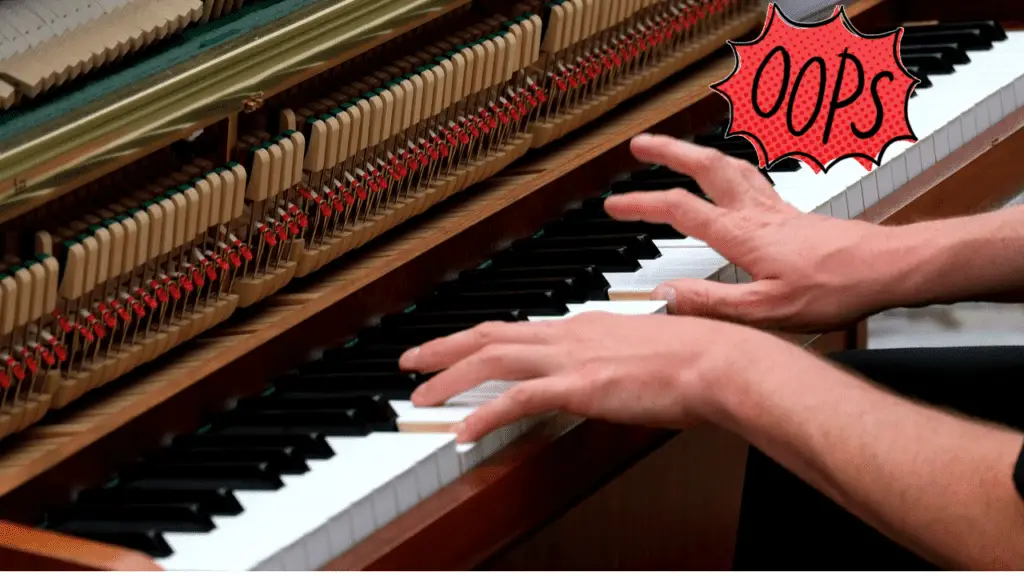This post contains affiliate links.
Many intense piano pieces demand to be played loudly and to play loudly, you’ll need to press the keys pretty hard. Sometimes, you’ll even need to pound the keys to create the loudest sounds possible, making the performance more impactful:
But because the piano is such a delicate instrument with many moving parts working together, pounding the keys like this is terrible and is bound to break some components like the keys or strings, right?
Piano strings won’t snap easily even if you play the piano loudly because pianos are made to never overstress the strings. With that said, time and usage will wear out and eventually snap the strings, regardless of how hard you’re playing the piano.
Continue reading to find out how the piano is designed so the strings are unlikely to snap even if you play loudly, under what conditions will playing loudly snaps the strings, and whether or not you should take precautions in your playing to not damage the piano.
I’ll also discuss if you can damage digital pianos by pounding the keys since digital pianos don’t use strings and hammers like acoustic pianos to create sounds.
Finally, I’ll talk about what you should do in case you play too hard and the strings snap.
Can you break an acoustic piano by playing too hard?
To know how pounding the keys breaks a piano, it helps to learn how the components inside a piano work together to create sounds:
When you press a key, a mechanism called an “action” will move the hammer to strike the strings, causing them to vibrate and create sounds. Piano actions are intricate components comprised of many moving parts. To see the piano action in action (pun intended), check out this video:
Most of the time, the way you would “break” a piano is by snapping the piano strings.
However, the strings themselves are made from durable steel material and the actions are designed such that even if you pound the keys, the hammers will only move in a limited range, making it less likely that the strings will be overstressed and snap.
In fact, the strings are made to last as long as the piano itself – around 50 years.
Although playing loudly wouldn’t snap the strings, under the right conditions (or wrong, depending on how you look at it), the strings will snap if you play loudly:
Condition of the piano
Strings in a second-hand piano that has been around for a while will snap more easily than ones in a brand new piano. This is because strings in old pianos tend to be out of tune, meaning they aren’t strung properly. Strings that aren’t strung right tend to snap more easily when played loudly.
Rusty strings in poorly maintained pianos also snap easily if you play loudly. Thus, you must consider carefully where to place the piano in your house. You can check out this article for more detail: Places Not To Put Your Piano At.
How often do you play the piano?
As you play the piano, the strings will wear out over time. The more you play, the higher the chance of the strings snapping, especially if you play loudly regularly.
There’s no helping it so don’t worry and play as loudly as you wish to. Everything breaks down eventually and you bought a piano to use it, not to let it sit in the corner and collect dust.
Brand name
Reputable brands like Yamaha use high-quality materials for the strings and careful construction, making the strings durable and can withstand rough playing better than no-name brands.
If you’re curious about what a piano string snapping sounds like, check out this video:
Scary, right? It is as loud as firecrackers. Not to mention it’s out of nowhere and will give you a fright. So if you want to play loudly but are afraid of the sounds of snapping strings, consider getting a digital piano.
Digital pianos don’t use strings and thanks to the advancement in technology, modern digital pianos sound and feel the same as acoustic pianos.
I recommend taking a look at the Yamaha Clavinova line of pianos. These are high-end pianos with decent key action that feels the same as real weighted keys and rich sounds at an affordable price. My teacher even said that he would buy a Clavinova if it’s for a good price, regardless if he needs it or not.
Should you watch how hard you’re playing to avoid breaking the piano?
As established earlier, pianos are made with being played loudly in mind. So you can play as hard as you want without worrying about breaking the piano.
When a piano string does break, it’s most likely because of other factors like the condition of the strings, and your playing only pushes it over the top and finally snaps the strings.
Furthermore, most of the time, you won’t play so loud that you need to pound the keys. Pounding the keys is tiring to the hands and you will achieve the same effect by controlling the volume anyway.

Can you break a digital piano by playing too hard?
Piano keys on electric keyboards or low-end digital pianos will become loose if you play the piano loudly regularly.
Unlike acoustic pianos, electric keyboards and low-end digital pianos aren’t made to last 50 years of use since technology advances too quickly and newer, more advanced digital pianos hit the market every year.
Thus, manufacturers don’t use high-quality materials to make these types of pianos. This is why electric keyboards tend to be the cheapest among different types of piano.
On the other hand, high-end digital pianos like the Clavinova have better electrical parts, solid plastic, tougher metal, and piano keys that can withstand hard piano playing. This is why high-end digital pianos can last as long as acoustic pianos.
What to do if a string snaps because you played too hard?
Definitely call a technician to replace broken strings. Unlike guitars where you can replace the strings yourself, piano strings are under 200 lbs (90kg) of tension and you can hurt yourself pretty badly if you don’t know what you’re doing.
Thus it’s best to leave it to professionals. Technicians even have to wear goggles and leather gloves for safety reasons when replacing piano strings.
Technicians will also tune the new strings so that you don’t have to waste time figuring out how to tune them yourself.

